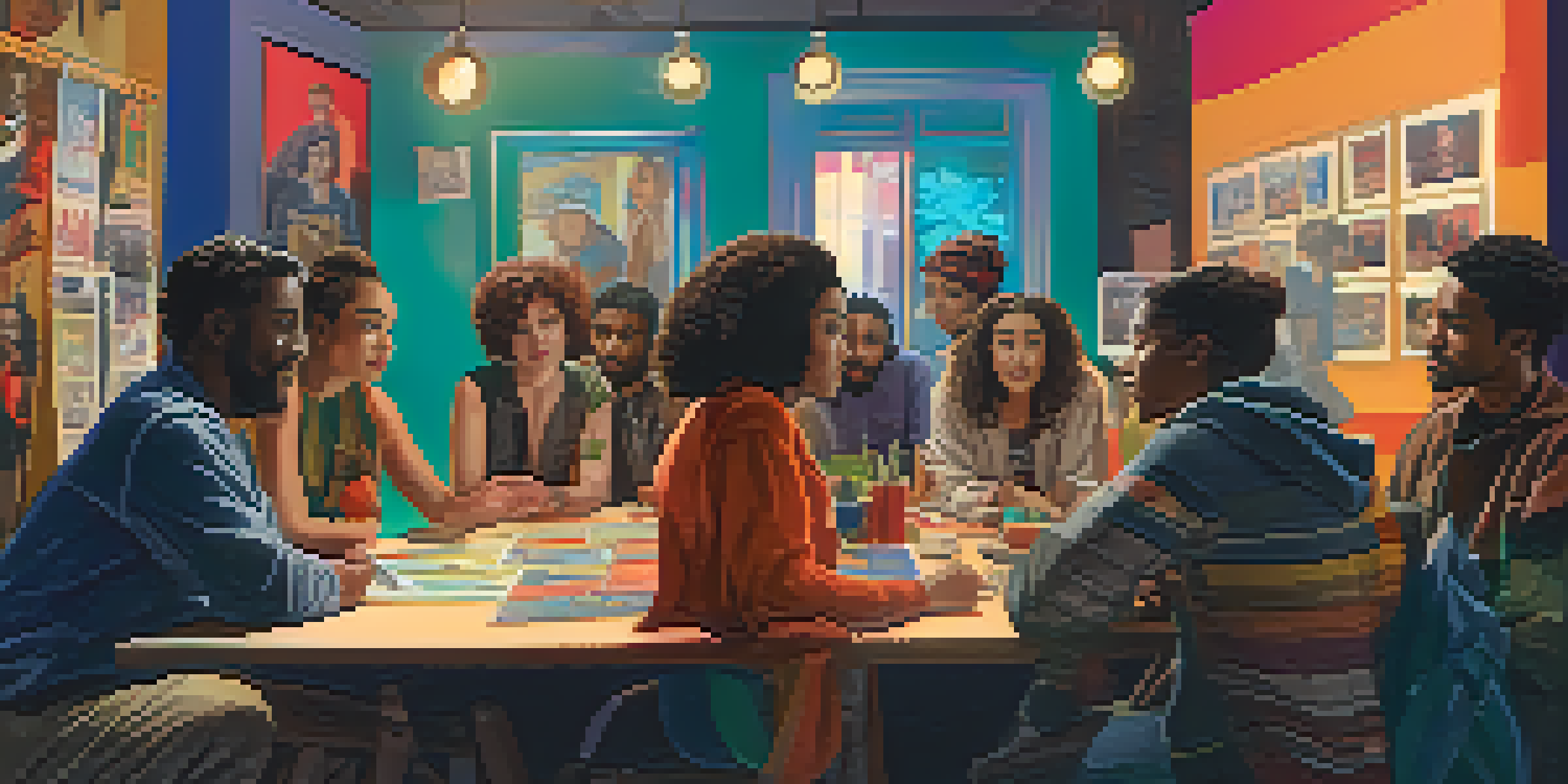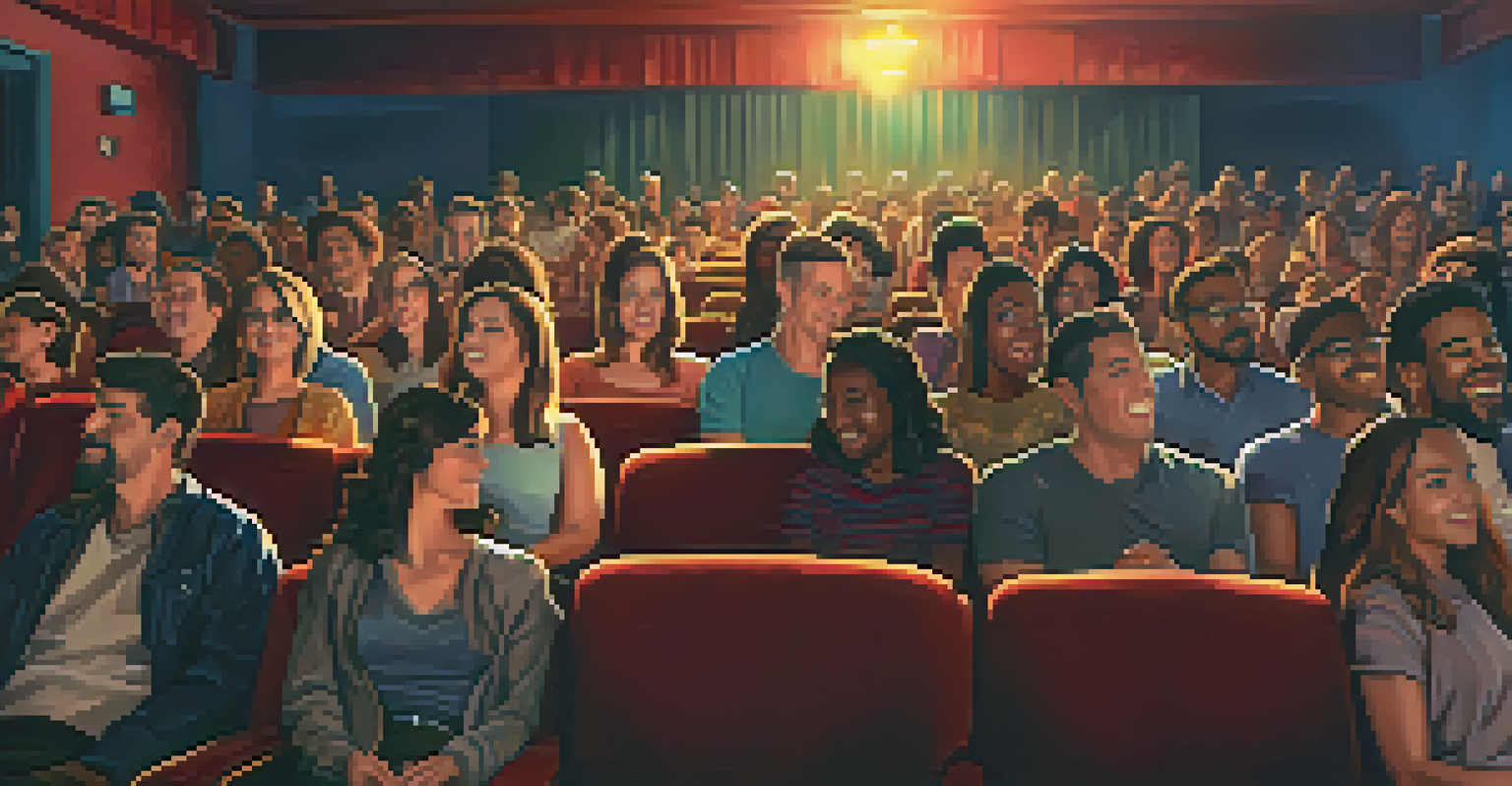The Impact of Stereotypes in Film: A Call for Ethical Change

Understanding Stereotypes in Film and Their Origins
Stereotypes in film often arise from societal norms and historical biases. They are simplified and exaggerated portrayals of groups, which can lead to misrepresentation. For instance, the 'damsel in distress' trope reinforces outdated gender roles and diminishes women's complexities. Understanding their origins helps us see why these stereotypes persist in modern storytelling.
The most common way people give up their power is by thinking they don't have any.
These portrayals can shape our perceptions of different cultures, races, and genders. When filmmakers rely on stereotypes for comedic relief or dramatic tension, they inadvertently perpetuate harmful narratives. The impact is profound; audiences may internalize these portrayals, influencing their views and interactions in real life.
Recognizing and addressing these stereotypes is the first step toward ethical change in the film industry. By understanding their roots, we can challenge them effectively and promote more authentic representations of diverse characters.
The Consequences of Stereotyping in Cinema
Stereotyping in cinema can have far-reaching consequences, affecting not only how audiences perceive various groups but also how those groups view themselves. When a character is reduced to a stereotype, it strips away their individuality and reinforces negative perceptions. For example, the portrayal of Black characters as criminals can lead to real-world implications, fostering bias and prejudice.

Moreover, these stereotypes can limit opportunities for actors and filmmakers from diverse backgrounds. When roles are predominantly based on stereotypes, it leaves little room for authentic storytelling and complex character development. This lack of representation can discourage talented individuals from pursuing careers in film.
Stereotypes Shape Audience Perception
Stereotypes in film not only misrepresent groups but also influence how audiences perceive themselves and others.
Ultimately, the consequences of stereotyping can hinder societal progress and perpetuate inequality. By addressing these issues, the film industry can take meaningful steps toward inclusivity and representation, fostering a richer cultural narrative.
The Role of Filmmakers in Challenging Stereotypes
Filmmakers hold significant power in shaping narratives and challenging stereotypes. By choosing to portray characters with depth and nuance, they can break away from clichéd representations. For instance, films that showcase strong, multi-dimensional female characters can help redefine societal expectations and inspire audiences.
If you want to change the world, you have to change the story.
Moreover, filmmakers can diversify their storytelling teams to include voices from various backgrounds. Collaborating with writers, directors, and actors from different cultures can lead to authentic and respectful portrayals. This not only enriches the film but also fosters a greater understanding of diverse experiences.
In this way, filmmakers have the opportunity to be catalysts for change, using their platforms to challenge stereotypes and promote inclusivity. By prioritizing authentic representation, they can inspire audiences to embrace diversity and question the stereotypes they encounter.
The Audience's Role in Shaping Film Narratives
While filmmakers have a responsibility, audiences also play a crucial role in shaping film narratives. Viewer feedback can influence the types of stories that get told and the characters that are portrayed. When audiences demand more authentic representation, filmmakers are more likely to respond, leading to a shift in industry standards.
Social media has become a powerful tool for audiences to voice their opinions on stereotypes in film. Campaigns that advocate for diverse representation can reach wide audiences, sparking conversations about the need for change. This collective voice can pressure studios to reconsider their approaches to storytelling.
Filmmakers Can Drive Positive Change
By prioritizing authentic representation, filmmakers can challenge harmful stereotypes and promote inclusivity.
As consumers of film, audiences have the power to support projects that challenge stereotypes and promote diversity. By choosing to watch and share these films, they send a clear message to the industry: we want stories that reflect the rich tapestry of human experience.
Successful Films That Break Stereotypes
There are numerous films that have successfully challenged stereotypes and offered fresh perspectives. For example, 'Black Panther' not only showcased a predominantly Black cast but also highlighted the richness of African culture. This film broke barriers and provided a counter-narrative to the usual portrayals of Black characters in Hollywood.
Similarly, 'Crazy Rich Asians' made waves by featuring an all-Asian cast in a romantic comedy, a genre typically dominated by white characters. The film celebrated Asian culture while also breaking down stereotypes about wealth and privilege. Its success demonstrated that audiences are eager for diverse stories.
These films serve as a testament to the power of representation in film, proving that authentic storytelling can resonate with audiences and challenge preconceived notions. By spotlighting these successes, we can encourage more filmmakers to take bold steps toward inclusivity.
The Future of Film: Embracing Diversity and Authenticity
The future of film hinges on the industry's ability to embrace diversity and authenticity. As audiences continue to demand more realistic portrayals, filmmakers must adapt their narratives to reflect the world we live in. This shift toward inclusivity can lead to richer storytelling and a more engaged audience.
Moreover, as technology advances, independent filmmakers now have greater access to platforms for distribution. This democratization of filmmaking allows for a wider variety of voices and stories to be heard, further challenging the traditional narratives that have dominated Hollywood.
Audience Demand Fuels Representation
When audiences advocate for diverse stories, they encourage filmmakers to create narratives that reflect a broader spectrum of human experiences.
By prioritizing diversity and authenticity, the film industry can pave the way for a more equitable future. This evolution will not only enrich the cinematic landscape but also foster a culture of understanding and acceptance among audiences.
A Call for Ethical Change in the Film Industry
As we reflect on the impact of stereotypes in film, it's clear that meaningful change is necessary. The film industry must commit to ethical practices that prioritize authentic representation and challenge harmful stereotypes. This requires a collective effort from filmmakers, studios, and audiences alike.
Education plays a vital role in this transformation. By raising awareness about the implications of stereotypes and promoting discussions around representation, we can empower individuals within the industry to make informed choices. Workshops, panels, and resources can help foster a deeper understanding of these issues.

Ultimately, a call for ethical change in the film industry is about more than just storytelling; it's about shaping a more inclusive society. By demanding better representation, we can help create a film landscape that reflects the diverse world we live in.